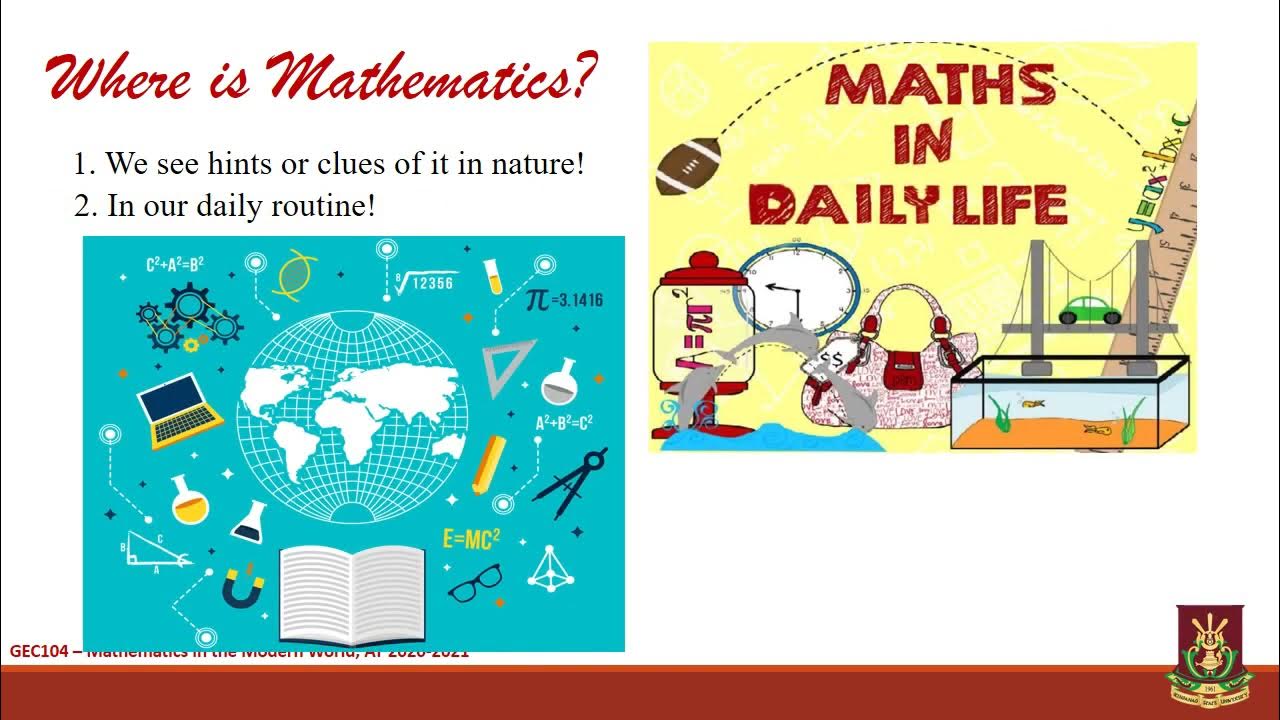The Language of Math
Summary
TLDRThis script emphasizes the integral role of mathematics in understanding and predicting societal and natural phenomena. It highlights how math serves as a language to decipher patterns in energy, climate change, and social sciences. The script underscores the importance of mathematical literacy for informed decision-making in various fields, including non-technical jobs, and stresses the need for enhanced math education to prepare students for a data-rich world where understanding numerical patterns is crucial.
Takeaways
- 🌐 Mathematics is a universal language for understanding the natural world, applicable to a wide range of societal issues including energy, climate change, and social sciences.
- 🔍 The script emphasizes the predictive power of mathematics, highlighting its role in foreseeing outcomes and understanding the structure behind natural systems.
- 📊 Mathematics is fundamentally about identifying and analyzing patterns, both numerical and spatial, which is a natural human tendency ingrained in our DNA.
- 🐟 The transcript provides an example of mathematical models in the fishing industry, illustrating how they can predict and understand the dynamics of fish populations and the potential for collapse.
- 🚀 Mathematics is not just for those in the field; it's essential for anyone to make informed decisions in a data-rich world driven by technology.
- 🏫 The importance of math education is underscored, with a call to action to strengthen it to prepare students for jobs that require decision-making based on data.
- 📉 The script points out a 'tipping point' in various fields, where mathematical models can reveal critical thresholds that, if crossed, lead to significant changes or collapses.
- 💼 It is noted that there is a shortage of students prepared for the modern workforce, even in non-technical jobs, due to a lack of mathematical literacy.
- 🌟 The script suggests that understanding the relevance of mathematics to the natural world can increase motivation to learn and appreciate its value.
- 📈 Mathematics is portrayed as a tool for enlightenment, helping individuals to comprehend the world around them beyond just technical applications.
- 🌍 The final takeaway is the profound implications of mathematical understanding for anyone aiming to lead an informed life in today's data-driven society.
Q & A
What is the role of mathematics in understanding societal problems?
-Mathematics serves as a language for understanding the natural world, helping to predict and comprehend the structure behind various societal issues such as energy, climate change, and social sciences.
Why is mathematics considered a fundamental tool in studying the natural world?
-At its core, mathematics is about identifying and analyzing patterns, both numerical and spatial, which are inherent in the world around us and part of human nature to observe and understand.
Can you provide an example of how mathematics is applied to real-world issues?
-One example is the use of mathematical models in the fishing industry to understand fish population dynamics and predict tipping points that could lead to the collapse of fish stocks.
What does the term 'tipping point' mean in the context of mathematical models for fish populations?
-A tipping point in this context refers to a critical threshold in the mathematical model where the fish population is likely to collapse if not managed properly.
How does mathematics impact various fields beyond just the scientific or technical ones?
-Mathematics is essential across all fields, including science, engineering, and even for informed citizenship, as it aids in decision-making processes that are often based on numerical data.
What is the current challenge in math education according to the transcript?
-The challenge is that not enough students are graduating high school prepared for jobs that require decision-making based on numbers, even if the jobs are not highly technical.
Why is it important for students to understand the connection between mathematics and the natural world?
-Understanding this connection can make students more motivated to learn mathematics, as they realize its practical applications and relevance in understanding the world around them.
How does the current world, influenced by computers and data, affect the importance of mathematics in everyday life?
-We live in a data-rich world due to computers, which means that even non-technical jobs require decision-making skills that are often based on numerical data, thus increasing the importance of mathematics.
What is one of the implications of not having a strong foundation in mathematics for students entering the workforce?
-Students without a strong math foundation may struggle with jobs that require data interpretation and decision-making, limiting their career opportunities and effectiveness in the workplace.
What does the transcript suggest about the role of mathematics in enhancing an informed citizenry?
-The transcript suggests that a strong understanding of mathematics is crucial for leading an informed life, as it enables citizens to make better decisions based on numerical data and patterns.
How can the appreciation of mathematics as a natural part of the world influence people's motivation to learn it?
-When people recognize that mathematics is not just a subject but a way to understand the natural world, they may become more interested and motivated to learn and apply mathematical concepts.
Outlines

This section is available to paid users only. Please upgrade to access this part.
Upgrade NowMindmap

This section is available to paid users only. Please upgrade to access this part.
Upgrade NowKeywords

This section is available to paid users only. Please upgrade to access this part.
Upgrade NowHighlights

This section is available to paid users only. Please upgrade to access this part.
Upgrade NowTranscripts

This section is available to paid users only. Please upgrade to access this part.
Upgrade NowBrowse More Related Video

MMW Lesson 1.4 Mathematics for Our World

Nature's Numbers By: Ian Stewart (Chapter 2: WHAT MATHEMATICS IS FOR?)

Mathematics helps Organize Patterns and Regularities in the World - MMW Group Activity

GEC104 Video Lecture 1 - Mathematics in our World (Part 1)

GEC104 Video Lecture 1 Mathematics in our World Part 1

NATURES MATHEMATICS PART-1 1080p HD DOCUMENTARY
5.0 / 5 (0 votes)